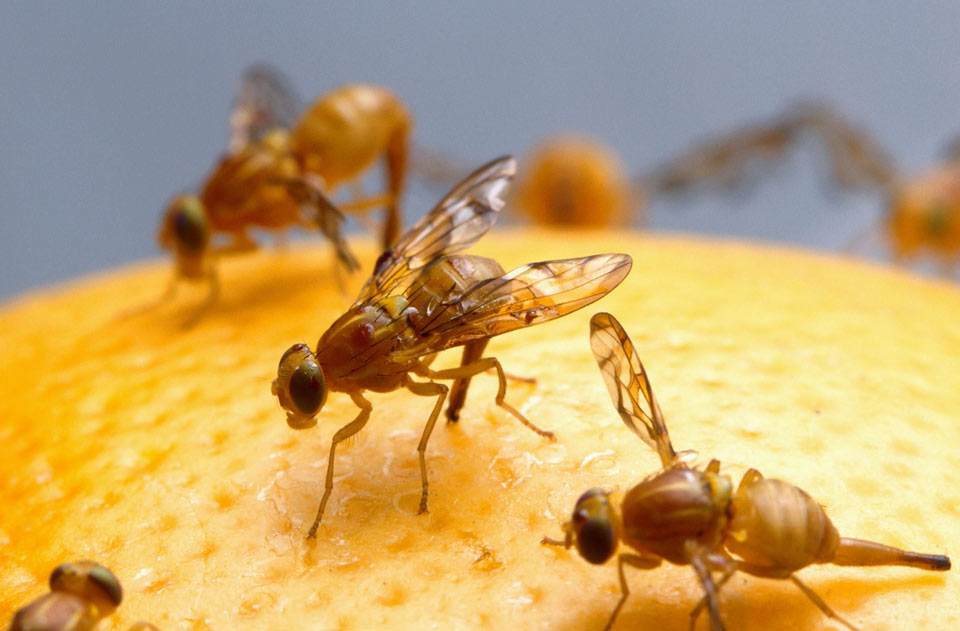(单词翻译:单击)
听力文本
This is Scientific American — 60-Second Science. I'm Karen Hopkin.
Got a minute?
I don't believe, in all my years, I have ever seen a fruit fly I would consider obese. But, thanks to the wonders of modern science, that's all about to change. Because a team of researchers from Cold Spring Harbor laboratory has produced the first flies that are genetically engineered to overeat.
If you are wondering...why...it's not as silly as it might sound. A big part of weight control has to do with making healthy dietary choices and knowing when to step away from the snack cabinet. But what controls those behaviors?
Well, we humans have a hormone called leptin that tells us that we're full. After eating, leptin is released from our fat cells. And it travels to our brains to signal that we've had enough. Indeed, people who don't produce leptin...or who lack the molecular machinery to detect it...really pack on the pounds.
In the new study, researchers discovered a hormone that acts the same way in flies. And when they deleted the gene that encodes it, the hormonally deficient insects just kept eating. And when presented with the fly equivalent of a high-fat or high-sugar diet, they gained three times more weight than did their hormonally competent peers. The findings appear in the journal Cell Metabolism.

Interestingly, giving human leptin to these tubby bugs eliminates their tendency to binge. That suggests that by studying these flies, scientists might learn something that's relevant to us.
In the meantime, researchers from the U.K. and Australia have also been plying flies with sweet treats. And they found that consuming large amounts of sugar may lead to fewer birthday cakes.
In this study, researchers compared the life spans of flies that ate a healthy diet, with 5 percent sugar...to those that went on a three-week bender of 40 percent sucrose. That's the equivalent, the researchers note, of a person who really took Marie Antoinette's advice to heart and ate only cake for two decades.
The results? The sugar-fed flies lost about 7 percent of their already brief 90-day life span. And that was even if they reverted to the healthy diet after their three weeks on sweets. These results appear in the journal Cell Reports.
The sugar overload apparently triggered long-term changes in gene activity...which accelerated aging and had the sugar-buzzed flies dropping like, well, like flies.
The findings suggest that you can have your cake and eat it, too. But not for long.
Thanks for listening for Scientific American — 60-Second Science Science. I'm Karen Hopkin.
参考译文
这里是科学美国人——60秒科学。我是凯伦·霍普金。
有一分钟时间吗?
我以为我在有生之年不会看到肥胖的果蝇。但是,由于现代科学的奇迹,这一切都将发生改变。冷泉港实验室的研究人员研制出了第一批饮食过量的转基因飞蝇。
如果你想知道为什么……其实它并不像听上去那么蠢。体重控制与健康的饮食选择和清楚何时远离快餐柜有很大关系。但是这些行为由什么控制呢?
我们人类有一种名为瘦素的荷尔蒙,这种荷尔蒙会发出“我们吃饱了”的信号。进食后,我们的脂肪细胞会释放出瘦素。然后瘦素会转运至大脑,传递出“我们吃饱了”的信号。事实上,不产生瘦素的人,或者缺乏检测瘦素的分子结构的人,体重的确会增加。
在这项新研究中,研究人员发现了一种在苍蝇身上起同样作用的荷尔蒙。当他们删除这种基因时,缺乏荷尔蒙的昆虫就会一直吃东西。当给苍蝇喂食同其本身大小相仿的高脂肪或高糖饮食时,相较于那些荷尔蒙充足的同类,它们的体重增加了三倍多。这项研究结果发表在《细胞新陈代谢》期刊上。
有趣的是,把人类瘦素植入这些发胖的苍蝇体内,可以消除它们暴饮暴食的倾向。这表明,通过研究这些苍蝇,科学家可能会学到一些与我们相关的事情。
同时,来自英国和澳大利亚的研究人员也一直在给苍蝇喂甜食。他们发现,消耗大量的糖可能会减少生日蛋糕的数量(指寿命的减少)。
在这项研究中,研究人员对饮食健康、每天摄入5%糖分苍蝇的寿命和那些连续三周摄入40%糖分苍蝇的寿命进行了对比。研究人员指出,这相当于一个人真的把玛丽·安托瓦内特的建议记在心里,在二十年的时间里只吃蛋糕。
结果呢?苍蝇过量摄入糖分使它们本就短暂的90天寿命又减少了7%。即使它们在连续吃甜食三个星期后恢复健康饮食也已经于事无补。这些研究结果发表在《细胞报告》期刊上。
显然,糖分摄入过量导致基因活动发生长期变化,这种变化加速了老化过程,也令以糖为食的苍蝇大批死亡。
研究结果表明,你可以享用蛋糕,但是不要长期食用。
谢谢大家收听科学美国人——60秒科学。我是凯伦·霍普金。
译文为可可英语翻译,未经授权请勿转载!
重点讲解
重点讲解:
1. thanks to 幸亏;归因于;
例句:Thanks to his hands, everything seems to come alive.
幸亏他的帮忙,一切都似乎有了好转。
2. in the meantime 在此期间;其间;
例句:In the meantime let us do the things we can.
在此期间让我们做些我们能做的事情。
3. even if 即使;尽管;纵然;
例句:Even if she were very busy,she would go.
既使她很忙,她也会去的。
4. revert to 恢复,回复(到以前的状态、制度或行为);
例句:He reverted to smoking when under stress.
他因受到压力又恢复了吸烟的习惯。


